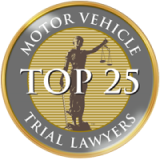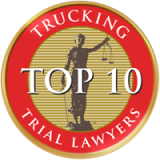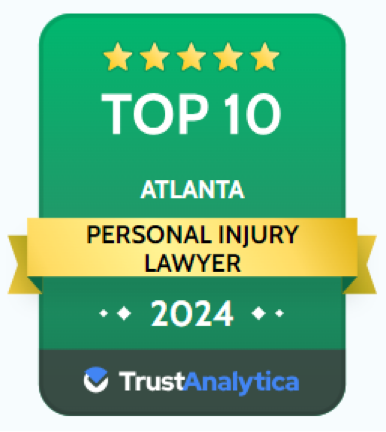All information provided about the law is very general in nature and should not be relied upon as legal advice. Every situation is different and should be analyzed by a lawyer who can provide individualized advice based on the facts involved in your unique situation, and a consideration of all of the nuances of the statutes and case law that apply at the time.
I Was A Passenger in an Uber/Lyft Accident. What Do I Do?
The immediate aftermath of an Uber or Lyft accident is similar to any car accident, but with some additional pieces of information that need accounting for.
You’re stepping out from a great night spent with friends and decide to make the intelligent decision and request a ride back home. The pick-up is smooth, a welcome difference from the chaos of your usual commute. After exchanging some pleasantries with the driver, you settle in and prepare for a calm ride back. An impact jolts you back up. The crash has you confused, scared, and possibly injured. This relaxing ride is over. Now, the aftermath.
As more people turn to ride-share options like Uber and Lyft to navigate their lives, it carries the unfortunate consequences of increasing Uber or Lyft accidents. The aftermath of these accidents can involve complex legal webs that many courts haven’t begun to unravel just yet.
Passengers in these Uber accidents suffer the same minor and significant injuries that other passengers in car accidents suffer. What differentiates a Lyft or Uber accident from typical car accidents is that multiple insurance companies may be looking to avoid responsibility for that passenger’s pain. If you’re navigating the aftermath of an Uber driver accident, read on and see how a rideshare accident lawyer can help.
First Steps After an Uber or Lyft Driver Accident
The immediate aftermath of an Uber or Lyft accident is similar to any car accident, but with some additional pieces of information that need accounting for. The absolute first step after an Uber accident is making sure that you are okay and that you contact emergency services.
Contact Emergency Services
In some accidents, it’s an obvious decision to call 911. Injuries may be readily apparent, or you may know you aren’t feeling okay. But in other accidents, passengers may be fortunate enough to avoid major injuries, or so they think. Sometimes, injuries can take a few days to become a noticeable enough issue to warrant a trip to the emergency room. That’s why—no matter how you feel right after the accident— you call emergency services.
This allows you to speak to the police and enter the accident report as a passenger. The police report is a critical document in any litigation that follows, as it certifies that you were at the scene as a passenger in the accident.
Document the Accident
After ensuring everyone is okay and that anyone who needs medical assistance has received it, you should move to document the accident. Take photographs and videos of any cars involved in the crash. You can also get pictures of any street signs or lights that may have been blocked from view or malfunctioning, as these can be critical in a claim. If there are any skidmarks on the road, these are important to photograph as well.
Get Contact Information For All Parties
Having your information on the police report is necessary, but getting everyone else’s information is just as important. Do not leave the scene after speaking with police and identifying yourself as an Uber or Lyft passenger. Instead, if you’re not injured, collect the contact information for everyone involved in the accident. You will also need to know their insurance information for the claims process to follow.
Speak to Eyewitnesses
If you can speak to eyewitnesses, get their information and perhaps even a recorded statement. Be sure to get all the appropriate information, including their cell and home numbers, full address, and email address. These eyewitness accounts are some of the first things to disappear as time moves on after an accident. Following up with these eyewitnesses can bolster a subsequent claim with the insurance companies or a potential jury.
Do Not Accept Blame or Apologize
As a passenger in an accident, you are unlikely to be responsible. Still, it’s imperative that you don’t apologize, apologize on behalf of your driver, or accept any blame for the accident. Heated exchanges happen after some accidents, which can often lead to further injuries, insults, and lost claims as blame is hurled around. Avoid these confrontations as much as possible.
Contact a Rideshare Accident Attorney
As soon as you can after an accident, you’ll want to reach out to a trusted rideshare accident attorney in your area. Turning to an attorney or firm that provides free consultations, upfront payment policies, and direct communication offers the best chance for your claim. It’s best to call an attorney before speaking with any insurance companies to avoid making any mistakes that could jeopardize your claim.
Call Your Auto Insurance Company
Once you’ve spoken with an experienced Uber accident attorney, you must contact your auto insurance provider and the at-fault driver’s insurance. It’s best to have your attorney present for this outreach as they can help their clients navigate the questions and traps that the insurance companies use to ensare unsuspecting accident victims. Even a benign question may be a trick to getting a victim to admit guilt for the accident falsely.
What Compensation Exists in a Rideshare Accident Claim?
The purpose of insurance, and why people file insurance claims, is to be made whole for a covered loss or injury. For a Lyft accident passenger, their claim will depend on the severity of their injuries. Many claims will pay out for the economic damages the accident causes. This includes medical benefits, wage benefits, and, in some cases, accidental death.
Medical Benefits
One of the primary sources of compensation for an Uber accident is medical benefits. The at-fault driver or insurance company is supposed to cover the costs of medically necessary treatment that a passenger needs following an accident. This can include hospital visits, prescription drugs, and physical therapy.
Seeking and receiving medical care as soon as possible after an accident is vital because the insurance companies may assert that your injuries were not caused by the accident or that the extent of your injuries is being exaggerated.
Besides being an affront to an injured victim’s conscience, these assertions cause economic strain for injured victims and their families. That’s why having knowledgeable representation matters. An experienced rideshare accident attorney can push back against insurance company bullying.
Wage Benefits
An entire household can suffer if the injuries cause a rideshare passenger to miss work. To prevent this hardship, auto insurance policies should cover wages lost as victims recover from injuries. To receive these benefits, proper documentation for pre-accident wages must be sent to the insurers to verify that your information is correct.
There may also be benefits available for lost earning capacity. If the injury impacts a victim’s ability to work at the same job or hours, a wage difference could result. The difficulty with lost earning capacity is that there’s less documentation available to demonstrate this loss. This is another area where a knowledgeable rideshare accident attorney can help. They’ll be able to argue for the maximum compensation available for the changes in their client’s ability to work.
Accidental Death Benefits
An unfortunate reality with the rise of rideshare is a related rise in rideshare accidents. Research shows that since rideshare apps entered the US, there’s been an annual 3% rise in auto deaths, mainly affecting passengers and drivers. No one should have to grieve the loss of a loved one while stressing about how to honor their life properly. That’s why surviving friends and families deserve an advocate who will fight to ensure these claims are handled with care, empathy, and strength.
How Does a Rideshare Attorney Help Injured Passengers?
Every dollar an insurance company spends on your claim is a dollar less in profit. Understanding this mindset makes it clear why they’ll stop at almost nothing to avoid paying out what a claim is worth. Even when they agree to foot the bill, they may only provide an insultingly low payout to push your claim aside.
Instead of focusing on an injured victim’s health and well-being, Insurance companies will bring all their resources to bear to avoid paying what’s owed. Their team of trained adjusters and high-powered attorneys can overwhelm an injured victim standing alone. Where can you find an advocate then?
Speaking with a trusted Lyft driver accident attorney can make the difference between getting nothing and getting what you deserve. As an advocate in your corner, a rideshare accident attorney can help throughout the claims process. If their client can’t document the scene, they can photograph and follow up with eyewitnesses or drivers to substantiate your injuries.
Veteran rideshare attorneys can also protect clients from making potentially harmful statements on recorded calls or official documents. These attorneys can even recreate the accident scene if needed to demonstrate what happened, when, and why. The earlier a legal advocate is brought on, the more beneficial they are to the smooth processing of a claim because critical information can vanish in minutes.
They’re also well-versed in how the Peach State handles liability for Uber and Lyft drivers.
What Happens If I’m Injured While in an Uber or Lyft In Georgia?
In auto accident claims, like many personal injury claims, the person responsible for the injury may not have the money to cover the damages they’ve caused. Instead, their insurance compensates the injured victim directly. But what happens when their insurance coverage isn’t enough for the damages?
Insurance Requirements In Georgia
Each state sets the minimum insurance requirements because there is no national standard. According to Georgia law, each driver must have $25,000 for bodily injury liability per person, $50,000 for bodily injury liability per accident, and $25,000 for property damage liability per accident.
For a driver to register their vehicle in Georgia, they must show that they have maintained this coverage. For passengers in Uber or Lyft accidents, O.C.G.A § 40-5-39 requires that rideshare drivers provide proof of minimum insurance coverage before they can begin driving for these companies.
Georgia, like many states, is a fault-state. This means that the driver who was at fault for the accident must pay the damages to the injured victims. If your Uber or Lyft driver was at-fault, their insurance should reimburse you for injuries. But this is often where complications begin.
Who’s Insurance Pays In Georgia?
The at-fault system above can become challenging when the at-fault driver is your Uber or Lyft driver. In many cases, the driver’s insurance company will not pay for the damages because they have a personal auto policy.
Personal auto policies cover accidents and injuries when a person drives a car for personal reasons. Ridesharing driving requires commercial auto insurance; many drivers either don’t know or can’t afford this coverage.
Rideshare Company Insurance Requirements
Georgia lawmakers recognized the gap this policy exclusion created and passed legislation to ensure that injured victims have recourse available. According to O.C.G.A § 33-1-24, rideshare drivers must have an insurance policy that provides $50,000 per person and $100,000 per occurrence for death, personal injury, and $50,000 for property damage per occurrence.
Their policy must also provide uninsured and underinsured motorist coverage with minimum limits of $300,000.00 for bodily injuries or death per accident, with a maximum of $100,000.00 for bodily injuries or death per person and $25,000.00 for loss of or damage to property of others per accident.
Because the state recognized that most drivers likely could not afford these limits, rideshare companies must provide this coverage to drivers without it. In Georgia, when the driver lacks proper or adequate coverage, the rideshare companies’ insurers should pick up the tab from the first dollar.
How Does Alabama Treat Injured Rideshare Accident Passengers?
Alabama has similar codes to Georgia regarding driver insurance requirements and similar rideshare drivers policies.
Alabama’s Minimum Insurance Requirements
Alabama operates a fault system for automobile accidents. Like Georgia, the driver at fault will be responsible for the subsequent damages when an accident occurs.
Their minimum insurance requirements are similar to those of Georgia. Under AL Code § 32-7-6, drivers must have insurance coverage for at least $25,000 for bodily injury or death for one person, $50,000 for bodily injury or death of two or more people in any one accident, and $25,000 for property damages per accident.
Minimum Insurance For Rideshare Drivers
Alabama also requires that rideshare drivers, companies, or a combination of the two provide minimum insurance for injuries that result while a driver uses the app and while the driver is actively transporting a passenger.
When there’s a passenger in the vehicle for a pre-arranged ride, AL Code § 32-7C-2 applies and requires that the rideshare driver has liability insurance that provides $1,000,000 for death, bodily injury, and property damage. Unlike Georgia, the requirements do not stipulate separate minimum coverage for death, injury, and property damage.
What Happens When An Alabama Uber Driver Doesn’t Have Insurance?
Alabama law requires Uber and Lyft drivers to maintain the minimum insurance to drive for those rideshare companies. There are instances where that driver’s coverage may lapse while they continue to drive, but it’s far more common that they don’t have adequate coverage for an accident while driving for these rideshare companies.
When that happens, Alabama law requires the rideshare companies’ insurance to cover the accident as the primary insurer. Further, they mandate that this insurance apply even before the driver’s personal auto insurance policy denies the claim.
Alabama’s Contributory Negligence
One of the most critical aspects of Alabama law to be aware of is its contributory negligence rules. In Alabama, if an injured victim is even 1% at fault for their injuries, they can not recover in a personal injury claim.
The strict nature of that rule heightens the need to reach out to representation before initiating a claim. If the insurance company suspects any fault on an injured passenger’s part, they may push to deny coverage and fight to establish that claim before a judge or jury.
Injured Rideshare Passengers In Florida
Florida operates under different laws than states like Georgia and Alabama because Florida operates a no-fault auto accident system.
Florida’s No-Fault Accident System
When an auto accident occurs in Florida, fault is not considered important when paying out claims. A driver involved in an accident files a claim with their personal auto insurance company. Injured passengers who own a vehicle also file a claim through their personal auto insurance, even though they weren’t driving.
Injured passengers who don’t own a car must file through the driver of the vehicle they occupied during the accident. So, if you’re an injured passenger in an Uber or Lyft accident, you’ll likely need to file a claim through their insurers.
Florida Minimum Insurance Requirements
The no-fault rules in Florida create additional insurance requirements above what other nearby states require. Under Title 23-324.021, drivers must have a minimum of $10,000 in personal injury protection, $10,000 for bodily injury or death of a person, $20,000 for accidents involving two or more people, and a minimum of $10,000 in property damage liability.
When a rideshare driver has a passenger, these jump to a combined minimum of $1 million for death, bodily injury, and property damage, according to Title 37 Chapter 627.748 Section 7. Like Alabama, Florida does not require the driver’s insurance to deny the claim. Instead, if the driver’s insurance is insufficient, the rideshare company’s insurer takes the claim from the first dollar of damages.
Understanding the complexities of Florida’s no-fault insurance system can be a challenge, which is why having trustworthy representation makes a difference. Rideshare attornies experienced with Florida’s laws understand the nuances and changes that are taking place.
Tennessee Laws Regarding Injured Rideshare Passengers
Tennessee operates a system similar to Georgia and Alabama. It is a fault state that does not require drivers to purchase personal injury protection in their insurance policy.
Tennessee Rideshare Insurance Requirements
Like many states, Tennessee has minimum insurance requirements for liability. Tenn. Code Ann. § 55-12-102 requires that Uber and Lyft drivers have personal auto insurance that covers up to $25,000 for each injury or death per accident, $50,000 for total injuries or deaths per accident, and $25,000 for property damage per accident. The law also allows for a single limit of $65,000 per accident to satisfy the requirements of the law.
These are the personal auto insurance requirements for Tennessee drivers. But Tennessee, under Tenn. Code Ann. § 56-7-1119 allows insurance companies to expressly exclude coverage when drivers are logged into apps like Uber and Lyft.
When drivers have passengers in the vehicle, they must have coverage under Tenn. Code Ann. § 55-12-141. This law requires drivers, rideshare companies, or a combination of the two to have at least $1,000,000 for death, bodily injury, and property damage.
Like other states, Tennessee requires the rideshare companies to step in first if the driver does not have sufficient coverage. That likely means that an injured passenger should prepare to file a claim with the rideshare company’s insurer.
Montlick. Our Attorneys Know What it Takes to Win®.
Rideshare apps like Uber and Lyft offer flexibility to move around cities and towns like never before. For many, they’re a critical connection to shopping and services. But when you find yourself in the backseat of an of an Uber during an accident, that freedom and flexibility go out the window.
At Montlick, we have an experienced team of rideshare accident attorneys who advocate for our clients so they can focus their energy on healing. While our clients recover, we pursue maximum compensation from negligent parties to ensure our clients have everything they need to move on from the accident. Whether it’s the rideshare company’s insurance or the driver’s, we stand up to these companies and ensure they don’t bully our clients into accepting less than what they’re owed.
Contact us today to see how Montlick can make a difference. Your initial consultation is free.
How useful is this for you?
Would you like to speak with an attorney?
Call NowRelated Questions
Related Practice Areas
We Win More than Settlements.
We win the peace-of-mind you need to get your life back.
At Montlick, we believe comprehensive legal representation is a right, not a privilege. That’s why we provide our services on a contingency fee basis. You only pay when we win.








